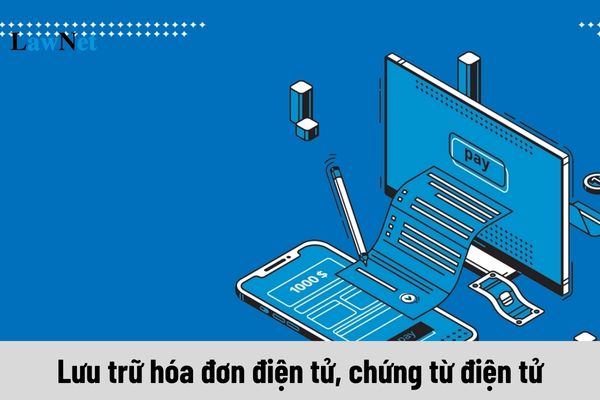What are regulations on the retention of e-invoices and records in Vietnam according to Decree 123?
What are regulations on the retention of e-invoices and records in Vietnam according to Decree 123?
According to Clauses 1 and 2, Article 6 of Decree 123/2020/ND-CP, the following regulations are outlined:
Storage and retention of invoices and records
1. invoices and records must be stored and retained to ensure:
a) Safety, confidentiality, integrity, completeness, and unaltered status during the retention period;
b) Correct and sufficient retention duration as prescribed by accounting laws.
2. e-invoices and records are stored and retained electronically. Agencies, organizations, and individuals have the right to choose and apply methods of preserving and storing e-invoices and records suitable for their operational characteristics and technological capabilities. e-invoices and records must be ready for printing or can be accessed upon request.
3. invoices printed by tax authorities, printed records, and self-printed must be stored and retained according to the following requirements:
a) Unissued invoices and records must be retained in warehouses according to the storage and retention policies of valuable records;
b) Issued invoices and records within accounting units must be retained according to accounting record storage regulations;
c) Issued invoices and records in organizations, households, and individuals not functioning as accounting units must be stored and retained as their private property.
Similarly, Article 41 of the Accounting Law 2015 includes the following provisions:
Storage and retention of accounting records
1. Accounting records must be fully and safely stored by the accounting unit during usage and retention.
2. In cases where accounting records are temporarily retained or seized, there must be a record attached with a copy of the accounting records; if the records are lost or destroyed, there must be a record attached with a copy or a confirmation.
3. Accounting records must be retained within 12 months from the end date of the fiscal year or the conclusion of accounting tasks.
4. The legal representative of the accounting unit is responsible for organizing the storage and retention of accounting records.
5. Accounting records must be retained for the following durations:
a) At least 5 years for accounting records used for the management and operation of the accounting unit, including supporting records not directly used for bookkeeping and financial reporting;
b) At least 10 years for supporting records directly used for bookkeeping and financial reporting, annual financial statements, unless otherwise specified by law;
c) Permanently retained for records of historical significance, with important economic, security, and defense value.
6. The Government of Vietnam specifies the types of accounting records required for retention, retention duration, commencement of the retention period stated in Clause 5 of this Article, retention locations, and procedures for the disposal of retained accounting records.
Thus, e-invoices are accounting records directly used for bookkeeping and financial reporting. Therefore, the retention duration for e-invoices is 10 years.

Regulations on the retention of e-invoices and records in Vietnam according to Decree 123 (Image from the Internet)
What contents are included in an e-invoice in Vietnam?
According to Article 10 of Decree 123/2020/ND-CP and Article 4 of Circular 78/2021/TT-BTC, the contents of e-invoices include:
- Name of the invoice, invoice symbol, invoice template number.
- Invoice link name applicable to invoices printed by tax authorities as per the guidance of the Ministry of Finance.
- Invoice number.
- Seller's name, address, and tax code.
- Buyer's name, address, and tax code.
- Name, unit of measurement, quantity, unit price of goods and services; subtotal excluding VAT, VAT rates, total VAT by each tax rate, total VAT, total payment including VAT.
- Signature of the seller, signature of the buyer.
- Invoice issuance date.
- Date of digital signing on the e-invoice.
- Tax authority code for e-invoices with tax authority's code.
- Fees, charges belonging to state budget, trade discounts, promotions (if any) as guided at point e, clause 6 of this Article and other related contents (if any).
- Name, tax code of the organization printing invoices for invoices printed by the tax authority.
- Letters, numbers, and currency displayed on the invoice.
- Other content on the invoice.
What acts are prohibited related to invoices and records in Vietnam?
Prohibited acts related to invoices and records are specified in Article 5 of Decree 123/2020/ND-CP, including:
- For tax officials
+ Causing inconvenience and difficulty for organizations and individuals purchasing invoices and records;
+ Engaging in acts of concealment or collusion with organizations and individuals to use illegal invoices and records;
+ Accepting bribes when inspecting or examining invoices.
- For organizations and individuals who sell or provide goods and services, and related individuals
+ Engaging in fraudulent practices such as using illegal invoices or illegal use of invoices;
+ Obstructing tax officials in the performance of their duties, specifically acts that harm the health and dignity of tax officials during invoice and record inspection or examination;
+ Unauthorized access, alteration, or destruction of invoice and record information systems;
+ Bribery or involvement in other related invoice and record acts for unlawful gain.

